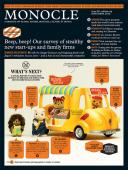
Issue 86
Beep, beep! Our survey of stealthy new start-ups and family firms. World exclusive: we talk the banger business and hedgehog funds with Japan’s miniature success story — and a host of real characterful companies
In This Issue
Oops! No content was found.
Looks like we no longer have content for the page you're on. Perhaps try a search?
Return Home

